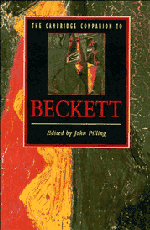Book contents
- Frontmatter
- 1 An endgame of aesthetics
- 2 Beckett's English fiction
- 3 Three novels and four nouvelles
- 4 Waiting for Godot and Endgame
- 5 Stages of identity
- 6 Beginning again
- 7 The mediated Quixote
- 8 Dead heads
- 9 Disabled figures
- 10 Beckett's poems and verse translations or
- 11 Beckett as director
- 12 Beckett's bilingualism
- 13 Beckett and the philosophers
- Further reading
- Index
13 - Beckett and the philosophers
Published online by Cambridge University Press: 28 May 2006
- Frontmatter
- 1 An endgame of aesthetics
- 2 Beckett's English fiction
- 3 Three novels and four nouvelles
- 4 Waiting for Godot and Endgame
- 5 Stages of identity
- 6 Beginning again
- 7 The mediated Quixote
- 8 Dead heads
- 9 Disabled figures
- 10 Beckett's poems and verse translations or
- 11 Beckett as director
- 12 Beckett's bilingualism
- 13 Beckett and the philosophers
- Further reading
- Index
Summary
Beckett studies, despite a phenomenal growth over the last three decades or so, has only just begun to articulate clearly and fully the essential 'differences' - in the traditional as well as more specialized meanings of the word - with which it is engaged, particularly with reference to the vexed but fundamental question of Beckett's relationship to the philosophers. Is Descartes, with or without the Baroque Rationalism of the Occasionalists Geulincx and Malebranche, critical in dealing with this issue, as the early period of criticism in English affirmed? Or is the 'Cartesian' question basically irrelevant, as is implied by those who chose to focus on Logical Positivism or Existentialism? Or are both of these approaches hopelessly passé in the context of Post-Structuralist critical theory? The whole question of Beckett's relationship to the philosophers is pretty obviously in need of a major critical reassessment.
- Type
- Chapter
- Information
- The Cambridge Companion to Beckett , pp. 222 - 240Publisher: Cambridge University PressPrint publication year: 1994
- 14
- Cited by

